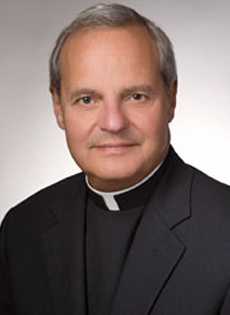
Para desarrollar l�deres que salven la Tierra
Monday, August 16, 2010
*Msgr. Franklyn Casale
En estos dÃas, la preocupación ambiental y BP son casi sinónimos. Sin embargo, mucho antes del trágico derrame de petróleo en el Golfo de México, la gente comenzó a darse cuenta de que el ambiente se convertÃa en un tema prominente de la conciencia y el desarrollo mundial.
Muchos negocios privados y públicos, al igual que las instituciones gubernamentales, ya habÃan realizado esfuerzos para reducir su huella de carbono. Por su parte, las familias también ayudan, a su manera, a preservar la belleza de la creación de Dios. Nuestro Santo Padre, el Papa Benedicto XVI, ha expresado que el ambiente âes un don de Dios para todos, y su uso representa para nosotros una responsabilidad para con los pobres, las generaciones futuras y toda la humanidadâ.
Como educadores, padres y ciudadanos responsables del mundo, tenemos la obligación de cuidar nuestro planeta. Si pensamos a nivel local, podemos comenzar al inculcar la conciencia ambiental en las mentes de nuestros jóvenes, motivándoles a obtener un grado en ciencias o, como adultos, al asistir a sesiones informativas en las que podemos examinar en detalle los asuntos de actualidad. Las organizaciones comunitarias y no-gubernamentales pueden iniciar programas ecológicos, pero muy poco se podrá lograr si el sector público no establece medidas legislativas apropiadas, o no realiza los pasos necesarios para impulsar el plan.
Recientemente, la universidad de St. Thomas estableció un programa de maestrÃa en sostenibilidad ambiental. El tÃtulo en leyes es resultado de la colaboración entre las escuelas de leyes de las universidades de Barry y St. Thomas, y de los fondos otorgados por las religiosas dominicas de Adrian para establecer un Centro para la Jurisprudencia de la Tierra (Center for Earth Jurisprudence).
Este nuevo tÃtulo no sólo será para abogados, sino para todos los profesionales que estarán tratando los asuntos cada vez más complejos que afectan el ambiente. En estos tiempos, toda corporación, organización sin fines de lucro, universidad y negocio está sujeto a alguna ley ambiental y necesitará personas entrenadas para descubrir los distintos asuntos y mantenerse al tanto de un número mayor de regulaciones.
En el mes de julio, las escuelas de leyes de las universidades de Barry y St. Thomas organizaron una conferencia sobre integridad ecológica, que cubrió temas como la reconexión de los humanos, ofrecer cuidado de la salud a los pobres, y la búsqueda de soluciones para el hábitat. La doctora Vandana Shiva, ambientalista reconocida a nivel mundial y ganadora del premio Right Livelihood (Derecho al Sustento, también conocido como la âalternativa al Premio Nóbelâ), discutió la integración ecológica y la urgencia de proteger la diversidad biológica de la tierra en el contexto de la agricultura orgánica a menor escala. La Dra. Mira Shiva, directora de The Initiative for Health Equity and Society (Iniciativa para la Igualdad de la Salud y la Sociedad), exploró los vÃnculos entre la integridad ecológica y los asuntos de salud pública que afectan a las poblaciones vulnerables. Entre otros expertos presentes se encontraba Leonie Hermantin, subdirectora de Lambi Fund, quien discutió los planes de reconstrucción en HaitÃ.
Hace años, la universidad de St. Thomas también decidió establecer un programa sobresaliente de ciencias. El programa se encuentra en el moderno edificio de ciencias y tecnologÃa Carnival Cruise Lines. Nuestra facultad altamente calificada realiza investigaciones exhaustivas financiadas por el gobierno, con todos los estudiantes de licenciatura que se especializan en las ciencias.
En el futuro cercano, Estados Unidos enfrentará una escasez de cientÃficos. Si lo vemos desde el lado positivo, protegeremos el planeta con las innovaciones de los futuros cientÃficos de América, pues los estudiantes de hoy realizan investigaciones cientÃficas en instalaciones acuáticas, estudian el ambiente para el crecimiento de las plantas, se especializan en otras áreas de la ciencia, o estudian las leyes ambientales. Como institución académica, deseamos contribuir al entrenamiento y la educación de nuestros estudiantes para que se conviertan en lÃderes que conserven la Tierra y provean para el desarrollo saludable del pueblo de Dios.


Comments from readers
However, is it enough? Could the effort of �developing leaders to save the Earth� be expanded to other schools at STU? I am suggesting a project from the School of Theology and Ministry in which the Catholic Social Teaching on the environment be taught and reflected to help in the development of a moral conscience towards our responsibility to the environment.
This project will follow the successful path set for the Science program and the Law School. Also, this project could involve other schools at STU, or other universities, such as FIU's organic garden. As an IPM graduate (2007) and someone concerned for the environment, I offer myself to be part of this initiative.
Responsible Christians know about Creation and how we should keep our environment clean. We do not need overly zealous movements.